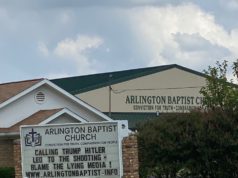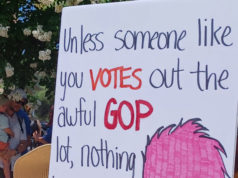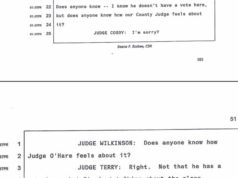While not the first time in history, COVID-19 broke the barrier between the realms of science and politics. The pandemic, along with the accompanying accumulation of knowledge, development of guidelines, and public health measures taken, occurred in a fairly transparent and public manner. In fact, one could say it inadvertently provided unprecedented knowledge of, and access to, the medical and public health spheres.
Traditionally, the American public has left science — the modern and secular religion — to be debated and decided among scientists. However, health science and politics are now interconnected and misunderstood by many in our community. Alleged experts, policymakers, and leaders across the board have come out with politicized and hyperbolic statements that have misled average citizens. In turn, average citizens have played a dangerous game of telephone with hearsay.
As an epidemiologist who has been working closely with local businesses and health care facilities, I want to share three takeaways about the way we, as a society, relate to our health.
1.) All knowledge is tentative. Harvard University epidemiology professor Dr. Rothman wrote, “The tentativeness of our knowledge does not prevent practical applications, but it should keep us skeptical and critical.”
COVID-19 was a novel virus, and there was no information about its transmission, prevention, and/or treatment. Real-time studies filled with both indispensable data and threats to the data’s validity guided protocols and guidelines that informed community measures and behaviors. Thus, advice changed as data changed, and the public’s behavior and concern changed as guidelines changed. While this is the case, one could argue that the most important relationship was the public’s trust in the scientific community.
2.) Business still knows best. The Centers for Disease Control and Prevention (CDC) recommended that anyone who tested positive for COVID-19 could end their isolation 10 days after their test date with certain conditions. The criteria stated these individuals must be fever-free for at least 24 hours, without the use of fever-reducing medications and with improvement of other symptoms. Even so, as a local epidemiologist, I interacted with multiple businesses who would not let an employee return until they could provide a negative COVID-19 test. While noble in intent and filled with integrity in their methods, this approach was not evidence-based, causing hardship for both the employee and the business. In such cases, non-contagious, recovered individuals continued to test positive for weeks — if not months at times — prohibiting employees from receiving their full compensation and businesses from operating at their optimal level. It also artificially inflated COVID-19 rates. Science did not inform business policies.
3.) Health is no longer all about “you.” Mask-wearing is uncomfortable to most. It can be suffocating and hard to breathe, especially for those with asthma and other respiratory conditions. It can be hot and itchy, leading to acne breakouts. Importantly, masks primarily prevent your respiratory droplets for others. Depending on the quality of the mask, it could offer some protection to you from others. At their core, however, masks are less about you and all about those around you. Taking care of yourself means taking care of others – for all. When we get vaccinated, we are taking care of ourselves and our neighbors, preventing the virus from spreading and mutating into something against which none of us have protection.
As demonstrated, health science and politics are more interconnected and still misunderstood by many in our community. However, the dialogue has improved, albeit by necessity. While it typically takes approximately 17 years for research to be implemented into practice, scientists did this overnight with imperfect information when addressing the COVID-19 pandemic and other novel viruses. This immediacy highlighted how knowledge is tentative and iterative. It elucidated our need for controlled and measured verbiage and transparent processes when communicating with the public. Even so, there is still a strong disconnect between segments of the business community and the science community. The seeds for partnership and dialogue need to be sown beforehand, so that the trust and social capital are built when needed. Finally, COVID-19 serves as a reminder that our fates are all intertwined, regardless of ethnicity, creed, or socioeconomic status. By protecting others, we protect ourselves. This is a paradigm change and a reminder that we exist in one space together. It is a wake-up call saying that we must transcend divides and practice decent dialogue prudently.
Joshua Yudkin, MPH MA, works as an epidemiologist with the Tarrant County Public Health Department. A doctoral student in epidemiology, he was recently awarded a Fulbright research grant and works at the intersection of community building and public health. He wrote this piece on his own volition. His views are his own and not necessarily those of the Fort Worth Weekly.
The Weekly welcomes all manner of political submissions. They will be edited for clarity and factuality. Please email Editor Anthony Mariani at anthony@fwweekly.com.












